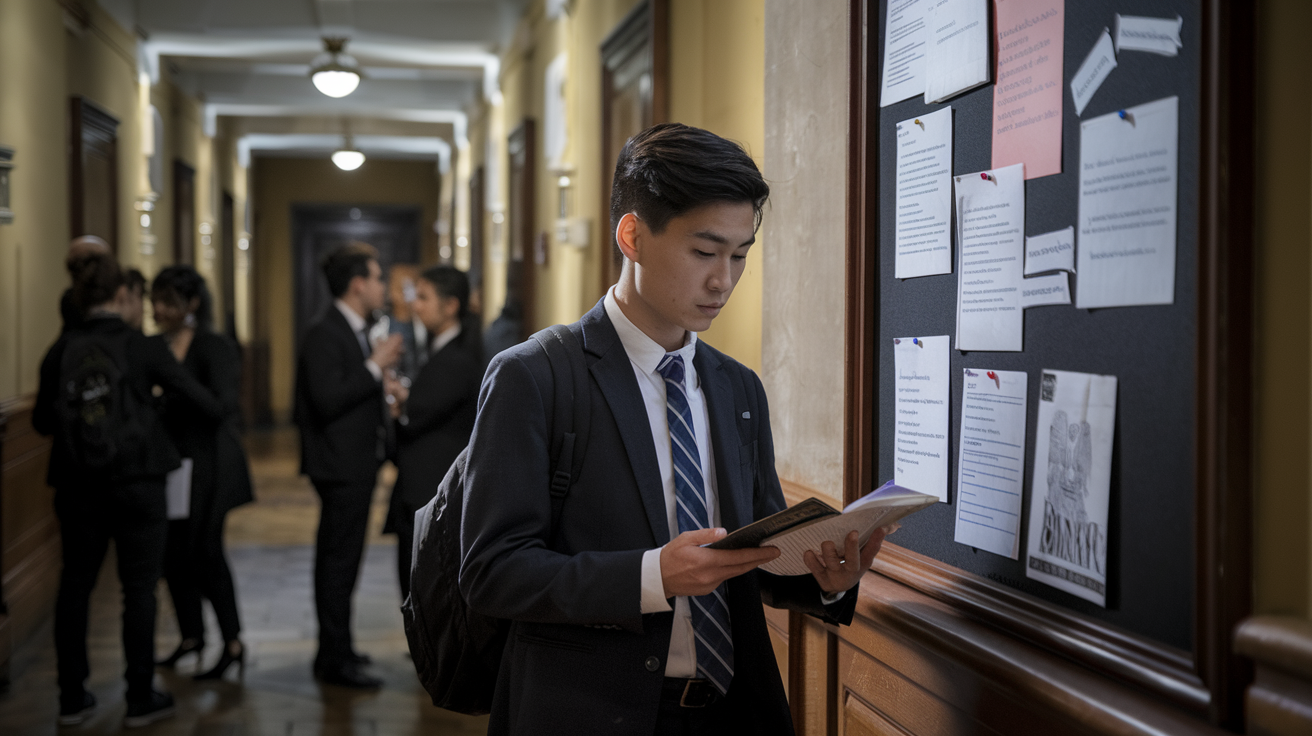
Have you ever wondered why some law students seem to effortlessly navigate the challenging waters of Philippine law school, while others struggle to stay afloat? 🤔 The truth is, there’s more to succeeding in law school than just hitting the books. Behind the scenes, a set of unwritten rules governs the path to becoming a successful lawyer in the Philippines.
Imagine stepping into a world where academic excellence is just the tip of the iceberg. A world where relationships can make or break your career, and where balancing personal life with studies feels like walking a tightrope. These hidden challenges can be overwhelming, leaving many aspiring lawyers feeling lost and unprepared. But what if you could unlock the secrets to mastering this complex ecosystem?
In this blog post, we’ll pull back the curtain on the unspoken rules of Philippine law school. From conquering academic rigors to navigating the hidden curriculum, we’ll explore six crucial areas that can transform your law school journey. Whether you’re a fresh-faced 1L or a seasoned law student, these insights will help you not just survive, but thrive in the competitive world of Philippine legal education. Let’s dive in and discover how you can set yourself up for success! 💼⚖️
Mastering the Academic Rigors

Embracing the Socratic Method
The Socratic method is a cornerstone of Philippine law school education. This teaching technique involves professors asking probing questions to stimulate critical thinking and expose students’ assumptions. To excel:
- Prepare thoroughly before class
- Actively listen to classmates’ responses
- Be ready to defend your position
- Embrace constructive criticism
Developing Effective Case Briefing Techniques
Case briefing is an essential skill for law students. A well-structured brief helps you analyze and remember key points of legal cases. Follow this format:
| Section | Description |
|---|---|
| Facts | Concise summary of case background |
| Issue | Legal question(s) to be resolved |
| Rule | Relevant law or legal principle |
| Analysis | Court’s reasoning and application of the rule |
| Conclusion | Final decision and its implications |
Navigating the Voluminous Reading Load
Law school demands extensive reading. To manage the workload effectively:
- Create a realistic reading schedule
- Utilize active reading techniques (highlighting, margin notes)
- Form study groups to divide and conquer assigned readings
- Use supplementary materials wisely (case digests, reviewers)
Adapting to Unique Exam Formats
Philippine law school exams often feature complex hypothetical scenarios. To succeed:
- Practice answering previous years’ exam questions
- Focus on issue spotting and legal analysis
- Develop a structured approach to problem-solving
- Improve your time management skills during exams
Now that we’ve covered the academic challenges, let’s explore the importance of building crucial relationships in law school.
Building Crucial Relationships

Forming Study Groups for Success
Study groups are a cornerstone of success in Philippine law school. They offer a collaborative environment where students can:
- Share insights and perspectives on complex legal concepts
- Practice case recitations and mock exams
- Divide research tasks for efficiency
Effective study groups typically consist of 3-5 members with diverse strengths. Here’s a table showing the ideal composition:
| Role | Contribution |
|---|---|
| The Organizer | Schedules meetings and keeps the group on track |
| The Researcher | Excels at finding relevant cases and statutes |
| The Explainer | Simplifies complex legal theories for others |
| The Devil’s Advocate | Challenges assumptions and promotes critical thinking |
Cultivating Mentor-Mentee Connections
Mentorship is invaluable in navigating the challenges of law school. Seek out mentors who can:
- Provide academic guidance
- Offer career advice
- Share personal experiences in the legal profession
To foster these relationships:
- Attend faculty office hours regularly
- Participate in school-sponsored mentorship programs
- Engage with guest lecturers and visiting professors
Networking with Alumni and Legal Professionals
Building a professional network early can open doors to internships and future career opportunities. Effective networking strategies include:
- Joining law school organizations and attending alumni events
- Participating in moot court competitions and legal conferences
- Utilizing social media platforms like LinkedIn to connect with professionals
Remember, networking is about building genuine relationships, not just collecting contacts. Approach each interaction with curiosity and a willingness to learn. As you progress through law school, these relationships will become an invaluable resource for academic support, career guidance, and professional development.
Balancing Law School and Personal Life

Managing Time Effectively
Effective time management is crucial for law students to balance academic demands with personal life. Here’s a breakdown of essential strategies:
- Prioritize tasks using the Eisenhower Matrix:
- Urgent and Important
- Important but Not Urgent
- Urgent but Not Important
- Neither Urgent nor Important
- Implement the Pomodoro Technique:
- 25 minutes of focused work
- 5-minute break
- Repeat 4 times
- Take a longer break (15-30 minutes)
| Time Management Tool | Purpose | Benefit |
|---|---|---|
| Calendar app | Schedule classes and deadlines | Visualize commitments |
| To-do list app | Track daily tasks | Stay organized |
| Time tracking app | Monitor study hours | Identify time-wasters |
Maintaining Physical and Mental Health
Law school can be mentally and physically taxing. Prioritize self-care with these tips:
- Regular exercise (30 minutes daily)
- Balanced diet with brain-boosting foods
- Adequate sleep (7-8 hours nightly)
- Mindfulness practices (meditation, deep breathing)
Nurturing Personal Relationships
Maintaining connections is vital for emotional support and work-life balance:
- Schedule regular catch-ups with family and friends
- Join study groups for academic and social benefits
- Participate in law school social events
- Communicate openly about your time constraints
Finding Stress Relief Outlets
Incorporate stress-reducing activities into your routine:
- Hobbies (reading, painting, music)
- Physical activities (sports, yoga, dance)
- Relaxation techniques (massage, aromatherapy)
- Volunteering or community service
Remember, a well-balanced life enhances academic performance and prepares you for a sustainable legal career. With these strategies, you’ll be better equipped to handle the pressures of law school while maintaining your personal well-being.
Navigating the Hidden Curriculum

Understanding Unspoken Classroom Etiquette
In Philippine law schools, unspoken classroom etiquette plays a crucial role in your academic success. Here are some key points to remember:
- Punctuality is paramount
- Dress professionally
- Participate actively, but don’t dominate discussions
- Show respect to professors and classmates
| Do’s | Don’ts |
|---|---|
| Arrive early | Use your phone during class |
| Take neat notes | Eat or drink noisily |
| Raise your hand to speak | Interrupt others |
| Address professors formally | Pack up before class ends |
Decoding Professor Expectations
Understanding what your professors expect can significantly impact your performance. Pay attention to:
- Syllabus details and reading assignments
- Preferred citation styles
- Grading criteria
- Office hours and communication preferences
Mastering the Art of Recitation
Recitation is a cornerstone of law school education. To excel:
- Prepare thoroughly for each class
- Practice concise and clear responses
- Anticipate follow-up questions
- Stay calm under pressure
Recognizing the Importance of Class Rankings
Class rankings hold significant weight in Philippine law schools. They often determine:
- Scholarship opportunities
- Internship placements
- Job prospects after graduation
To improve your ranking, focus on consistent study habits, seek help when needed, and strive for excellence in all assignments and exams.
With these insights into the hidden curriculum, you’ll be better equipped to navigate the complexities of law school. Next, we’ll explore how extracurricular activities can complement your academic journey and enhance your legal education experience.
Leveraging Extracurricular Activities

Joining Law School Organizations
Law school organizations offer invaluable opportunities for networking, skill development, and personal growth. Here are some key benefits:
- Professional connections
- Leadership experience
- Specialized knowledge
- Community service opportunities
| Organization Type | Benefits |
|---|---|
| Academic Societies | In-depth subject knowledge |
| Advocacy Groups | Social impact experience |
| Cultural Associations | Diversity and inclusion insights |
Participating in Moot Court Competitions
Moot court competitions simulate real-world legal proceedings, providing hands-on experience in:
- Legal research
- Oral advocacy
- Teamwork
- Time management
These competitions sharpen your analytical skills and boost your confidence in public speaking.
Contributing to Law Reviews and Journals
Writing for law reviews and journals enhances your:
- Legal writing skills
- Research abilities
- Critical thinking
- Publication record
This experience is highly valued by potential employers and can set you apart in your future legal career.
Engaging in Legal Clinics and Internships
Legal clinics and internships offer practical, real-world experience that complements your classroom learning. They provide:
- Hands-on legal work
- Client interaction
- Exposure to various legal fields
- Professional mentorship
These experiences can help you narrow down your career interests and build a strong professional network. As you engage in these activities, you’ll find yourself better prepared for the challenges of legal practice and the Philippine Bar Exam.
Preparing for the Philippine Bar Exam

Starting Bar Review Early
Starting your bar review early is crucial for success in the Philippine Bar Exam. Ideally, begin your preparation at least one year before the exam date. This allows ample time to cover all subjects thoroughly and revise multiple times. Here’s a suggested timeline:
| Time Frame | Focus Area |
|---|---|
| 12-9 months before | Review core subjects |
| 9-6 months before | Cover specialized subjects |
| 6-3 months before | Practice answering bar-type questions |
| 3-1 months before | Final revision and mock exams |
Focusing on Bar-Relevant Subjects
While all law school subjects are important, some carry more weight in the bar exam. Prioritize these subjects:
- Political Law and Public International Law
- Labor Law and Social Legislation
- Civil Law
- Taxation
- Mercantile Law
- Criminal Law
- Remedial Law
- Legal and Judicial Ethics
Understanding the Unique Format of Philippine Bar Questions
The Philippine Bar Exam consists of essay-type questions that require analytical thinking and comprehensive answers. To excel:
- Practice writing concise yet thorough answers
- Focus on issue spotting and legal reasoning
- Familiarize yourself with recent Supreme Court decisions
- Develop a systematic approach to answering questions
Developing Mental and Emotional Resilience for the Bar
The bar exam is as much a test of mental endurance as it is of legal knowledge. To build resilience:
- Establish a consistent study routine
- Practice mindfulness and stress-management techniques
- Maintain a support system of fellow bar reviewees
- Take regular breaks to avoid burnout
Remember, preparing for the bar exam is a marathon, not a sprint. Pace yourself and stay focused on your ultimate goal of becoming a lawyer.

Embarking on the journey through Philippine law school requires more than just academic prowess. It demands a holistic approach that encompasses mastering rigorous coursework, forging valuable relationships, and maintaining a delicate balance between studies and personal life. The hidden curriculum and unwritten rules play a crucial role in shaping a successful law school experience, while extracurricular activities offer opportunities for growth beyond the classroom.
As you navigate this challenging yet rewarding path, remember that your ultimate goal is not just to survive law school but to thrive and prepare for the Philippine Bar Exam. By embracing these unwritten rules and leveraging every aspect of your law school experience, you’ll be well-equipped to face the challenges ahead and emerge as a competent, well-rounded legal professional ready to make your mark in the Philippine legal landscape.
